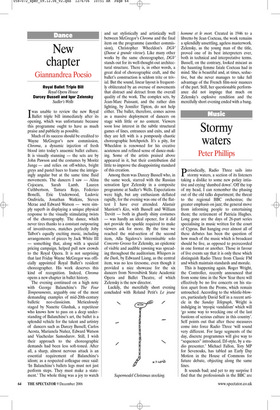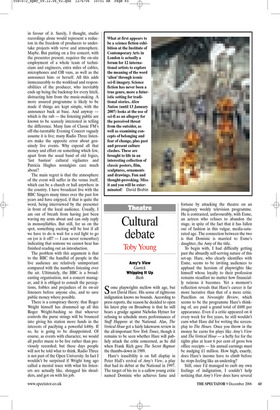Stormy waters
Peter Phillips
Periodically, Radio Three sails into stormy waters, a section of its listeners taking a dislike to some new policy intiative and crying ‘dumbed down’. Off the top of my head, I can remember the phasing out of the old talks department; the threat to the regional BBC orchestras; the greater emphasis on jazz; the general move from informing people to entertaining them; the retirement of Patricia Hughes. Long gone are the days of 26-part series specialising in music written for the court of Cyprus. But hanging over almost all of these debates has been the question of how much of the music which is broadcast should be live, as opposed to prerecorded in one format or another. Those in favour of live events say that it is only these which distinguish Radio Three from Classic FM and which maintain standards and morale.
This is happening again. Roger Wright, the Controller, recently announced that from some time in the New Year there will effectively be no live concerts on his station apart from the Proms, which remain untouched. According to the whistle-blowers, particularly David Self in a recent article in the Sunday Telegraph, Wright is indulging in ‘myopic vandalism’ which will ‘go some way to wrecking one of the last bastions of serious culture in this country’. Self points out that after these measures come into force Radio Three ‘will sound very different. For large segments of the day, discrete programmes will give way to “sequences” introduced, DJ-style, by a studio presenter.’ Michael Fallon, Tory MP for Sevenoaks, has tabled an Early Day Motion in the House of Commons for future debate, objecting along the same lines.
It sounds bad; and yet to my surprise I find that the professionals in the BBC are in favour of it. Surely, I thought, studio recordings alone would represent a reducton in the freedom of producers to undertake projects with verve and atmosphere. Maybe. But putting on a live concert, with the presenter present, requires the on-site employment of a whole team of technicians and engineers, extra miles of cables, microphones and OB vans, as well as the announcer himor herself. All this adds immeasurably to the workload and responsibilities of the producer, who inevitably ends up being the backstop for every hitch, distracting him from the music-making. A more assured programme is likely to be made if things are kept simple, with the announcer back at base. And anyway which is the rub — the listening public are known to be scarcely interested in telling the difference. Many fans of Classic FM’s off-the-turntable Evening Concert vaguely assume it is live; many Radio Three listeners make the opposite error about genuinely live events. Why expend all that money and effort on something which few, apart from the usual band of old fogies, ‘last bastion’ cultural vigilantes and Patricia Hughes nostalgists care much about?
The main regret is that the atmosphere of the event will suffer in the venue itself, which can be a church or hall anywhere in the country. I have broadcast live with the BBC Singers many times over the past few years and have enjoyed, if that is quite the word, being interviewed by the presenter in front of the local audience. Usually, I am out of breath from having just been waving my arms about and can only reply in monosyllables. But still, for us on the spot, something exciting will be lost if all we have to do is wait for a red light to go on (or is it off? — I can never remember) indicating that somone we cannot hear has finished reading out an introduction.
The problem with this argument is that to the BBC the handful of people in the live audience are relatively unimportant compared with the numbers listening over the air. Ultimately, the BBC is a broadcasting organisation, not a concert manager, and it is obliged to consult the perceptions, foibles and prejudices of its on-air listeners before anyone else, and to save public money where possible.
There is a conspiracy theory: that Roger Wright himself has drummed up all this Roger Wright-bashing so that whoever controls the purse strings will be bounced into giving his station more funds in the interests of pacifying a powerful lobby. If so, he is going to be disappointed. Of course, as events with character, we would all prefer music to be live rather than previously recorded; but these days people will not be told what to think. Radio Three is not part of the Open University. In fact I wouldn’t be surprised if Wright long ago called a mental truce with what his listeners are actually like, shrugged his shoulders, and got on with his job.



























































































 Previous page
Previous page